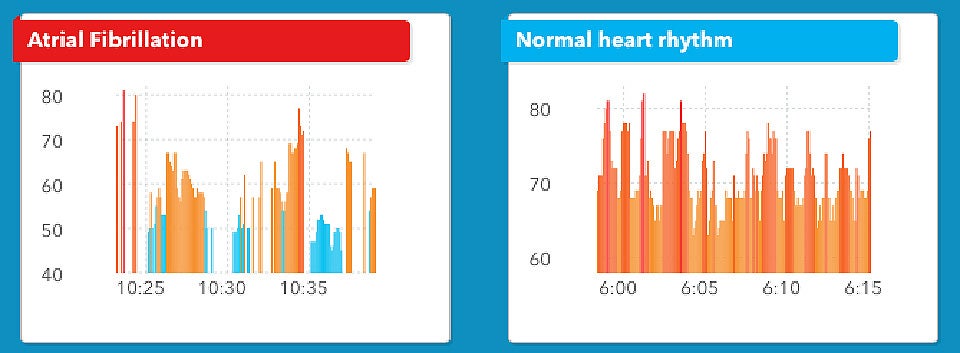AI-equipped Apple Watch Can Detect Irregular Heartbeat and Signs of a Stroke

This story originally appeared on Engadget
The Apple Watch may become a useful tool in detecting an abnormal heartbeat, according to a study by heart rate app-maker Cardiogram and the UCSF Health lab. They determined that the wearable, when paired with neural network algorithms, is 97 percent accurate in detecting paroxysmal atrial fibrillation (AF), the most common type of heart rhythm problem. With further work, the Watch and other wearables might help prevent strokes in susceptible patients.
Apple has been pitching the Watch with ResearchKit to doctors and scientists as a serious health tool. Cardiogram initiated the research last year to figure out whether it could detect the signs of a stroke, a quarter of which are caused by irregular heartbeats.
The study drew 6,158 Apple Watch users via the Cardiogram app — most had normal EKG readings, but 200 had an existing AF condition that made their hearts beat erratically. Engineers used those subjects to train a deep learning system to discern patients with arrhythmia vs. those with normal heartbeats.
They then tested the system on 51 patients scheduled for a procedure to restore normal heart rhythms. All used an Apple Watch and 12-lead ECG prior to and after the procedure. The AI algorithm and Apple Watch were able to identify AF with 97 percent accuracy and 98 percent sensitivity, according to the study.
The research holds a lot of promise, especially since the algorithm is just an early version and could easily be made more accurate. Two-thirds of strokes can be prevented with cheap drugs, but the onset of one is difficult to detect — so doctors could save the lives of susceptible patients with just an off-the-shelf wearable.
The team plans to tweak the algorithm and validate it against “gold standard” EKG tests. It will then incorporate it into the Cardiogram app, and “investigate the ability to detect health conditions beyond atrial fibrillation,” Cardiogram says. With that test a success, it could also push more hospitals and research groups onto ResearchKit and other wearables for patient monitoring and research.
The Apple Watch may become a useful tool in detecting an abnormal heartbeat, according to a study by heart rate app-maker Cardiogram and the UCSF Health lab. They determined that the wearable, when paired with neural network algorithms, is 97 percent accurate in detecting paroxysmal atrial fibrillation (AF), the most common type of heart rhythm problem. With further work, the Watch and other wearables might help prevent strokes in susceptible patients.
Apple has been pitching the Watch with ResearchKit to doctors and scientists as a serious health tool. Cardiogram initiated the research last year to figure out whether it could detect the signs of a stroke, a quarter of which are caused by irregular heartbeats.
The study drew 6,158 Apple Watch users via the Cardiogram app — most had normal EKG readings, but 200 had an existing AF condition that made their hearts beat erratically. Engineers used those subjects to train a deep learning system to discern patients with arrhythmia vs. those with normal heartbeats.
They then tested the system on 51 patients scheduled for a procedure to restore normal heart rhythms. All used an Apple Watch and 12-lead ECG prior to and after the procedure. The AI algorithm and Apple Watch were able to identify AF with 97 percent accuracy and 98 percent sensitivity, according to the study.
The research holds a lot of promise, especially since the algorithm is just an early version and could easily be made more accurate. Two-thirds of strokes can be prevented with cheap drugs, but the onset of one is difficult to detect — so doctors could save the lives of susceptible patients with just an off-the-shelf wearable.
The team plans to tweak the algorithm and validate it against “gold standard” EKG tests. It will then incorporate it into the Cardiogram app, and “investigate the ability to detect health conditions beyond atrial fibrillation,” Cardiogram says. With that test a success, it could also push more hospitals and research groups onto ResearchKit and other wearables for patient monitoring and research.






